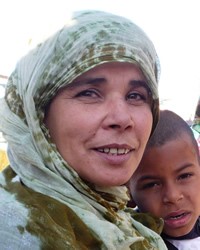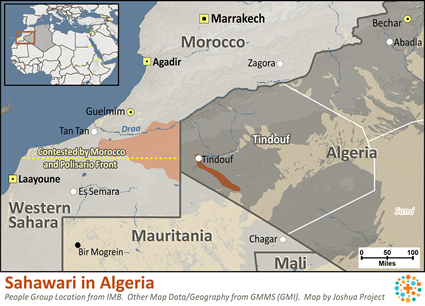A sub-group of the Moors, the Sahrawi are of mixed Berber, Arab and black African descent. Originally, the Sahrawi were desert nomads who traveled from place to place with their camels. The eight Sahrawi tribes were constantly at odds with one another, struggling for supremacy. Fighting, robbery and revenge were their means of surviving drought, plagues or another robbery. Peace through negotiation always followed.
The Sahrawi are associated with what we call Western Sahara, adjacent to Morocco. This location was colonized by Spain until 1976. Moroccan forces tried to annex this region. Many Sahrawi have fled to Algerian refugee camps, returned to the deserts, or joined the Polisario, which continues to demand independence from Morocco.
Since 1976 there has been a long-standing conflict between Morocco and the Sahrawi Polisario Front. Morocco claims Western Sahara, but Algeria sides with the Polisario, hoping to later negotiate for an outlet to the ocean. Sovereignty in the area remains unresolved. As a result of the war, many young Sahrawi men have joined the army, dividing families. Women and children have fled to refugee camps and depend on programs for basic necessities such as food and drinking water.
The Sahrawi live in an area of war and political turmoil. As a result, families have been divided. They need a lasting peace so they can get their lives back.
Pray for peace in the Western Sahara so Sahrawis in Algerian refugee camps can return to their homeland.
Ask God for the formation of Bible believing churches among Sahrawis in Algeria.
Pray that the Sahrawi would come to see Jesus Christ as the Prince of Peace and flee to him for refuge.
Pray for Christ's ambassadors to go to these Muslims, bearing the sin-forgiving Savior.
Scripture Prayers for the Sahrawi in Algeria.
https://reliefweb.int/report/algeria/forgotten-refugee-crisis-sahrawi-refugees-algeria#:~:text=The%20Sahrawi%20represent%20one%20of%20such%20crises%3A%20they,in%20south-west%20Algeria%2C%20heavily%20dependent%20on%20international%20assistance.
| Profile Source: Joshua Project |

























